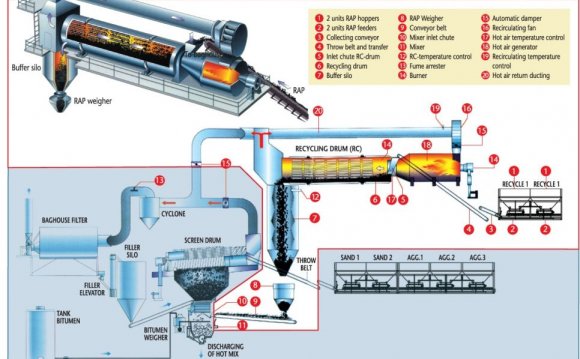
Asphalt is a heavy, dark brown to black mineral compound, one of many mixtures of hydrocarbons known as bitumens. Asphalt is a strong, functional weather condition and chemical-resistant binding product which adapts it self to a variety of utilizes. Asphalt binds crushed rock and gravel (often called aggregate) into company, tough surfaces for roads, roads, and airport run-ways. Asphalt, also called mineral pitch, is gotten from either normal deposits such as for example native asphalt or brea or as a byproduct of this petroleum business (petroleum asphalt). Primitive pet skeletons being maintained totally undamaged in normal asphalt build up, perhaps one of the most popular being the Los Angeles Brea Tar Pits in l . a ., Califomia.
Asphalt is just one of the planet's oldest engineering products, having been made use of because the beginning of civilization. Around 6000 B.C. the Sumerians had a thriving shipbuilding business that produced and utilized asphalt for caulking and waterproofing. As early as 2600 B.C. the Egyptians were utilizing asphalt as a waterproofing product also to impregnate the wrappings of mummies as a preservative. Ancient civilizations popular asphalt as a mortar for building and paving blocks used in temples, irrigation methods, reservoirs, and highways. The asphalts used by very early civilizations occurred naturally and were present geologic strata as either soft, practical mortars or as tough, brittle black colored veins of stone formations (also called asphaltic coal). Normal asphalts formed when crude petroleum oils worked their way up through splits and fissures into the earth's surface. The activity associated with the sun and wind drove off the lighter natural oils and gases, leaving a black residue. Normal asphalts had been thoroughly used before early 1900s. The discovery of refining asphalt from crude petroleum together with increasing popularity of the automobile served to significantly expand the asphalt business. Contemporary petroleum asphalt has got the exact same durable qualities as natural asphalt, because of the additional benefit of being refined to a uniform condition clear of organic and mineral impurities.
All of the petroleum asphalt created today is employed for highway surfacing. Asphalt paving material is a dull black colored blend of asphalt concrete, sand, and crushed stone. After being heated, it really is dumped out steaming hot on the roadbed, raked level, and then compacted by a heavy steamroller. Asphalt normally utilized for development joints and patches on concrete roadways. Airport runways, tennis courts, playgrounds, and flooring in buildings all utilize asphalt and. Light forms of petroleum asphalt labeled as roadway essential oils tend to be sprayed on roadways to stay dirt and bind gravel. Another major usage of asphalt is within asphalt shingles and roll roofing, which usually includes experienced soaked with asphalt. The asphalt helps you to protect and waterproof the roofing product. Other applications for asphalt include the following: waterproofing tunnels, bridges, dams and reservoirs; rustproofing and sound-proofing metal pipes and automotive under-bodies; and soundproofing walls and ceilings.
Raw Materials
The raw material utilized in contemporary asphalt manufacturing is petroleum, that will be a normally
 occurring fluid bitumen. Asphalt is an all-natural constituent of petroleum, and you can find crude natural oils that are virtually completely asphalt. Oil wells supply the crude petroleum towards oil refineries, where its separated into its different elements or fractions.
occurring fluid bitumen. Asphalt is an all-natural constituent of petroleum, and you can find crude natural oils that are virtually completely asphalt. Oil wells supply the crude petroleum towards oil refineries, where its separated into its different elements or fractions.
The Production
Process
Crude petroleum is partioned into its various fractions through a distillation process in the oil refinery. After separation, these portions are additional refined into various other products that include asphalt, paraffin, gas, naphtha, lubricating oil, kerosene, and diesel oil. Since asphalt could be the base or hefty constituent of crude petroleum, it does not evaporate or boil-off during the distillation procedure. Asphalt is actually the heavy residue of oil refining process.









